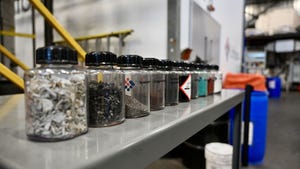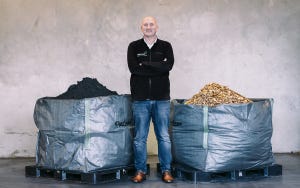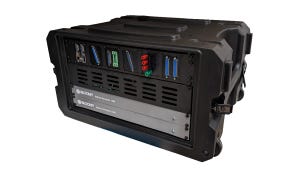Mercedes, Tesla, and Ford are the latest to put new battery chemistries under the hood.
April 17, 2023
Sila Nano's Titan Silicon will be used in the battery of the Mercedes Benz EQG G Wagon.Image courtesy of Sila.
Electric vehicle (EV) makers are facing increasing pressure to develop innovative battery technologies to power their vehicles. The global transition towards electrification has led to a surge in demand for EVs, and battery technology is at the forefront of this growth. While lithium-ion batteries have been the go-to power source for EVs for several years, concerns about their sustainability, safety, and limitations in terms of energy density have prompted EV makers to look towards novel battery technologies.
New battery technologies such as solid-state batteries, lithium-sulfur batteries, and metal-air batteries are gaining attention due to their potential to overcome the limitations of lithium-ion batteries. Solid-state batteries, for example, offer higher energy density, faster charging times, and greater safety compared to traditional lithium-ion batteries. Lithium-sulfur batteries, on the other hand, have the potential to offer even higher energy densities, while metal-air batteries could provide extended driving ranges for EVs.
The advantages of these new battery technologies are not just limited to performance - but they also have the potential to significantly reduce the environmental impact of EVs. The mining and processing of lithium, cobalt, and other metals used in lithium-ion batteries have raised concerns about the environmental impact of battery production. Novel battery technologies, such as solid-state batteries, have the potential to use less resource-intensive materials, reducing the environmental impact of EVs.
Let’s take a look at some news surrounding major EV makers and their transition towards novel battery technologies for the future of their EV offerings.
Mercedes works with Sila
Last week, Sila, a start-up in California that develops electric vehicle (EV) battery materials, made major headlines when it announced the commercial availability of its silicon-based anode batteries.
According to Sila, the new technology called "Titan Silicon", can deliver EVs with a 20% increase in range as compared to state-of-the-art EV batteries, while holding the potential to provide up to 100 extra miles for certain EVs. Moreover, Sila claims that its Titan Silicon can improve charging performance, with the ability to charge a battery from 10% to 80% in just 20 minutes, with further reductions to come in the future.
As a testament to the value of Titan Silicon, Mercedes-Benz has made headlines of its own by announcing that its upcoming Mercedes-Benz EQG G Wagon will be the first EV to employ Titan Silicon. This news follows Mercedes-Benz’s history with Sila, as it first invested in Sila in 2019, seeking advanced battery materials for its future EV line-up. Now that this investment is coming to commercial fruition, Sila aims to produce enough material to power one million EVs in the next five years, beginning with the Mercedes-Benz EQG G Wagon.
The Mercedes electric G wagon is expected to be released by the end of 2024 or 2025.
Tesla to use iron-based batteries
In other battery technology news, Tesla made headlines recently when it was announced that the company plans to use cheaper, iron-based batteries in its upcoming semi-heavy electric trucks and affordable electric car offerings.
Currently, Tesla uses nickel-based batteries for most of its Model 3 and Model Y vehicles sold in the US. However, reporting suggests that Tesla will use the LFP batteries in short-range heavy electric trucks, known as "Semi Light," with no specific launch date yet, and in small electric vehicles with 53 kilowatt-hours (kWh) capacity, as compared to the current Model 3 and Model Y vehicles that offer 75 kWh. Additionally, the batteries are said to eventually be used in Tesla's mid-sized vehicles, Model 3 and Model Y, although no timeline has been given for this transition.
The move towards LFPs is said to be in line with Tesla's efforts to cut assembly costs by half in future generations of cars, which will be built in Mexico and elsewhere. While Tesla currently sources its LFP batteries from China's CATL, which has no factory in the US, a need for a stronger domestic supply chain has pushed Tesla's South Korean supplier, LG Energy Solution, to build LFP batteries at its proposed Arizona factory.
Ford’s LFP move
As we’ve reported, Ford is investing $3.5 billion to build the first automaker-backed LFP battery plant in the US—called BlueOval Battery Park Michigan—which will open in 2026. The company cited the durability of LFP batteries, which tolerate faster, more frequent charging and require fewer expensive materials: “This lower-cost battery, at scale, will help Ford contain or even further reduce EV prices for customers,” the company stated. The company will begin offering LFP batteries to Europe-based Mustang Mach-E customers this year.
Click through for more details.
About the Author(s)
You May Also Like





